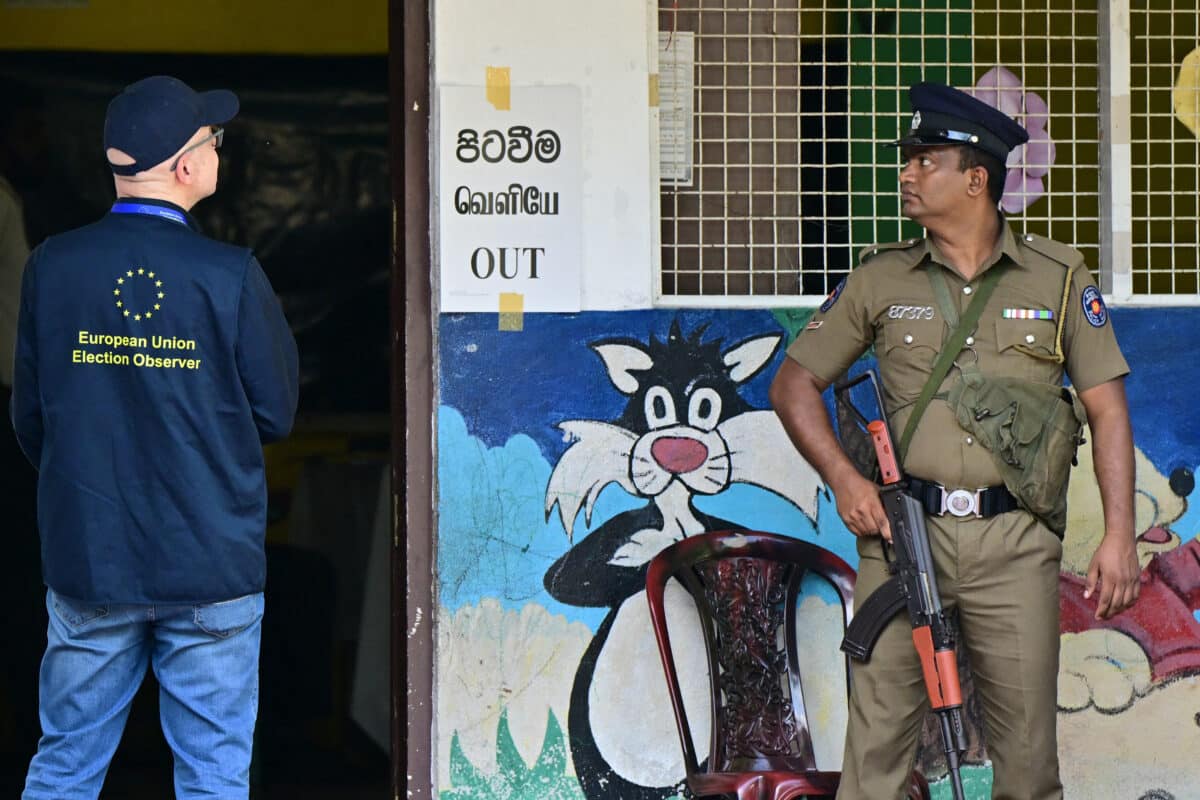Sri Lanka votes in first poll since economic collapse

An election observer (L) from the European Union is seen at a polling station during voting in Sri Lanka’s presidential election in Colombo on September 21, 2024. – Cash-strapped Sri Lanka began voting for its next president September 21 in an effective referendum on an unpopular International Monetary Fund austerity plan enacted after the island nation’s unprecedented financial crisis. (AFP)
COLOMBO, Sri Lanka – Cash-strapped Sri Lanka was voting for its next president Saturday in an effective referendum on an unpopular International Monetary Fund austerity plan enacted after the island nation’s unprecedented financial crisis.
President Ranil Wickremesinghe is fighting an uphill battle for a fresh mandate to continue belt-tightening measures that stabilised the economy and ended months of food, fuel and medicine shortages.
His two years in office restored calm to the streets after civil unrest spurred by the downturn in 2022 saw thousands storm the compound of his predecessor, who promptly fled the country.
“I’ve taken this country out of bankruptcy,” Wickremesinghe, 75, said after casting his ballot in the morning.
“I will now deliver Sri Lanka a developed economy, developed social system and developed political system.”
But Wickremesinghe’s tax hikes and other measures, imposed per the terms of a $2.9 billion IMF bailout, have left millions struggling to make ends meet.
“There should be a change in the country,” voter Mohamed Siraj Razik, 43, told AFP. “Extravagant state spending just to benefit politicians must end.”
Wickremesinghe is tipped to lose to one of two formidable challengers. One is Anura Kumara Dissanayaka, the leader of a once-marginal Marxist party tarnished by its violent past.
The party led two failed uprisings in the 1970s and 1980s that left more than 80,000 people dead, and it won less than four percent of the vote in the last parliamentary elections.
But Sri Lanka’s crisis has proven an opportunity for the 55-year-old Dissanayaka, who has seen a surge of support based on his pledge to change the island’s “corrupt” political culture.
Fellow opposition leader Sajith Premadasa, 57, the son of a former president assassinated in 1993 during the country’s decades-long civil war, is also expected to make a strong showing.
He vowed to fight endemic corruption, and both he and Dissanayaka have pledged to renegotiate the terms of the IMF rescue package.
“There is a significant number of voters trying to send a strong message… that they are very disappointed with the way this country has been governed,” Murtaza Jafferjee of think tank Advocata told AFP.
A total of 39 people are contesting the vote, including one 79-year-old candidate who remains on the ballot despite dying of a heart attack last month.
‘Wild elephants’
More than 17 million people are eligible to vote in the election, with more than 63,000 police deployed to guard polling booths and counting centres.
“We also have anti-riot squads on standby in case of any trouble, but so far everything is peaceful,” police spokesman Nihal Talduwa said.
“In some areas, we have had to deploy police to ensure polling booths are safe from wild animals, especially wild elephants.”
Dozens of people were lining up outside polling stations in Colombo before voting began, with a heavy security presence across the capital.
Polls close at 4:00 pm (1030 GMT), with counting to begin on Saturday evening.
A result is expected on Sunday, but an official outcome could be delayed if the contest is close.
Schools were closed on Friday to be converted into polling stations, which will be staffed by more than 200,000 public servants deployed to conduct the vote.
‘Not out of the woods’
Economic issues dominated the eight-week campaign, with public anger widespread over the hardships endured since the peak of the crisis two years ago.
Official data showed that Sri Lanka’s poverty rate doubled to 25 percent between 2021 and 2022, adding more than 2.5 million people to those already living on less than $3.65 a day.
Experts warn that Sri Lanka’s economy is still vulnerable, with payments on the island’s $46 billion foreign debt yet to resume since a 2022 government default.
The IMF said reforms enacted by Wickremesinghe’s government were beginning to pay off, with growth slowly returning.
“A lot of progress has been made,” the IMF’s Julie Kozack told reporters in Washington last week.
“But the country is not out of the woods yet.”